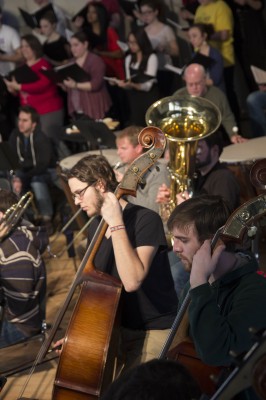Cornell College concert features piece that combines physics, philosophy and music
Fate or physics? Martin Hearne was searching for the right piece for the Cornell College Chamber Orchestra to perform, when he saw a name he’d read earlier that day in a newspaper column: Richard Feynman.
The legendary physicist and Nobel Prize winner is perhaps best known as the man who solved the mystery of the Challenger disaster. His curiosity about the world at large inspired composer Michael Gandolfi to write “QED: Engaging Richard Feynman,” an epic 22-minute piece, which was the first result on Hearne’s search. When he listened to it, Hearne knew it was the right choice.

The Cornell Chamber Orchestra and Concert Choir will perform “QED” at 7 p.m. Sunday, April 27, in King Chapel. This is only the second time this ambitious piece has been performed.
Gandolfi drew from a 1981 BBC interview with Feynman, where the scientist talks about finding and understanding the beauty of the world.
During the performance, the choir will sing selections of text from Walt Whitman, Ralph Waldo Emerson, Emily Dickinson, Siegfried Sassoon, Irish poet Joseph Campbell, and Gertrude Stein to further illuminate Feynman’s deep sense of curiosity, humor, and wonder.
Lisa Hearne, music professor and director of the concert choir, said the piece is almost like a film score in its structure and epic scale.
“This performance really shows what the Cornell College music program is capable of,” she said. “Our students are dedicated musicians in addition to the other aspects of their studies, and they are able to perform amazingly ambitious, high-level pieces because of that dedication.”
The piece calls for an extremely large orchestra and choir, and in addition to students, includes faculty members from outside the music department, including physics professor Lyle Lichty, theatre professor Jim VanValen, and math professor Ann Cannon; music department faculty and adjunct instructors; Cornell College Dean Joe Dieker; and several alumni, along with a selection of professional musicians.
The piece was premiered in 2010 by the Atlanta Symphony Orchestra, but the composer made revisions to the score, and this is the first time those revisions will be performed.
“The students are excited to be pioneers,” said Martin Hearne, music professor and director of the chamber orchestra, “and they’re excited to be sitting next to professional musicians in the orchestra.”
Segments of the BBC interview that inspired the piece will be projected behind the performers, making a complete multimedia experience.
In addition to “QED,” the orchestra will perform Walter Piston’s “The Incredible Flutist,” another large work which will involve students, community, and faculty. One of the great but lesser-known works of the 20th century, the piece begins in a sleepy village and paints the picture of the excitement building as the circus comes to town.
The choir will perform “Song for Athene,” an a capella piece by English composer John Tavener that’s perhaps best known for being sung during the funeral service for Diana, Princess of Wales.
A post-concert reception for the audience and performers will be held in the Thomas Commons.
Lisa and Martin Hearne were on the KCCK show “Culture Crawl” on April 10 to talk about the concert. A podcast of that show is available for download.



